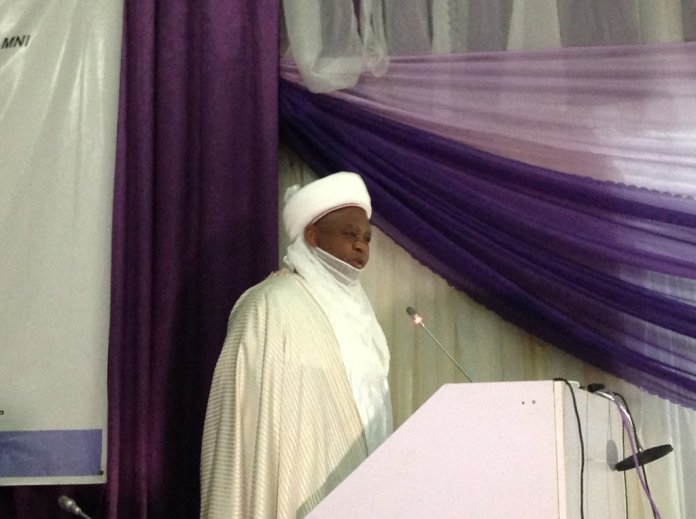
The Sultan of Sokoto and the president-general of the Nigerian Supreme Council for Islamic Affairs (NSCIA), Alhaji Muhammadu Sa’ad Abubakar III, has charged northern governors yet to domesticate the Child Rights Act (CRA) to do so in order to curb violence against women and children.
The eminent traditional ruler, who has taken the lead in the fight against sexual and gender-based violence, said the scourge continues to be very high in communities despite several intervention efforts by governments and different stakeholders at various levels.
So far, Kebbi, Kano, Katsina, Sokoto, Jigawa, Zamfara, Bauchi, Yobe, Gombe, Borno and Adamawa States are among states yet to domesticate the law which experts believed will strengthen the fight against the violation of the rights of women and children.
He was at a two-way Northern Traditional and Religious Leaders Submit on Ending Gender Based Violence (GBV) and Harmful Practices organised by Sultan Foundation in Abuja.
He said, “Every blessed day we hear frightening accounts of abuse of children, young women and boys, adults including those in matrimonial homes and in some instances mentally ill persons living on the streets. One began to wonder at the rate the world of sane people is turning to.
“Nigerians, and indeed the international community, look forward to us as traditional and religious leaders for a moral direction and practical support to realise a violence and harm-free society. Therefore, to address this menace headlong, I will make these passionate appeals as follows:
“We as royal fathers and faith leaders need to step up our roles as custodians of custom, tradition and faith in making sure that women and girls are safe, secured and protected. We are therefore committed to use our spheres of influence to change societal attitudes by reframing violence as a social problem. We will play an active role in broader efforts to prevent violence against women and girls. Strengthen our alliances and networks with organisations working on gender-based violence, to help raise the visibility of the problem on the national agenda; identify champions among our membership who will lead awareness-raising interventions to end all forms of violence against women and girls.”
Governments at all levels, he said, should adopt through appropriate domestication the Violence Against Persons Prohibition (VAPP) Act and Child Rights Act (CRA) without further delay, to protect our women and girls.
He said, “Beyond the adoption of the laws, we need to strengthen law enforcement and awareness of the law around gender-based violence. Everyone should understand that violence against women and girls is unacceptable and will no longer be tolerated.
“Government at community level should put in place a sex-offenders’ register to name and shame perpetrators and end the impunity around gender-based violence.
“Government should establish and fund at least one GBV response centre and shelter with government-paid staff deployed and with effective linkages to other support services that survivors may need. In addition, government should establish at least one forensic lab in each geopolitical zone in the country to support the prosecution of GBV cases,” Sultan added.
Meanwhile, Vice President Yemi Osinbajo, president of the Christian Association of Nigeria (CAN), Rev Samson Ayokunle and United Nations (UN) deputy secretary-general, Hajiya Amina Mohammed, have said violence against women and girls must stop in Nigeria for the country to move forward.
Speaking at the summit, Osinbajo urged state governments to intensify efforts to address gender-based violence in their territories.
Represented by the minister of women affairs and social development, Dame Pauline Tallen, the VP said the federal government remains committed to supporting deliberate measures to tackle the menace.
He, however, said unless all stakeholders took practical steps to protect the vulnerable population, especially women and girls, the country would be the worse for it in the years ahead.
Osinbajo said, “For the Child Rights Act, I am so pained and my heart is heavy that 10 states in the North are yet to domesticate it. Same goes for the Violence Against Persons Prohibition (VAPP) Act. Only three states in the northeast and northwest regions have domesticated the Child Rights Act.
“I want to use this opportunity to commend the governor of Kaduna State, apart from domesticating the laws, also amended the VAPP Act to deal with offenders. It is high time we move to action. We cannot keep talking without action.
Ayokunle said the abuse of the girl-child and the vulnerable must no longer be allowed to continue.
He said, “All forms of gender-based violence are appalling in the 21st Century. We should all rise up to eradicate them. Our society will be better through our collective action in this direction,” he said while charging royal fathers and faith leaders to step up their roles as custodians of customs, tradition and faith in protecting women and girls.
On her part, Amina Mohammed said religious and cultural practices contribute to discrimination against women and gender-based violence.
Amina said one out of every three women experience gender-based violence in their lifetime, adding that the COVID-19 pandemic had exacerbated the challenge by reversing the gains made in addressing the issue.
For information on Press Releases, Photos, Promotional Events and Adverts, Please message us on WhatsApp via (+234) 09052129258, 08124662170 or send an email to: info@educeleb.com.

























